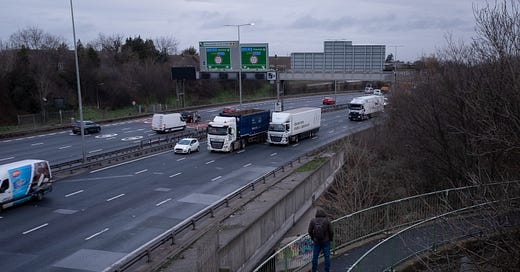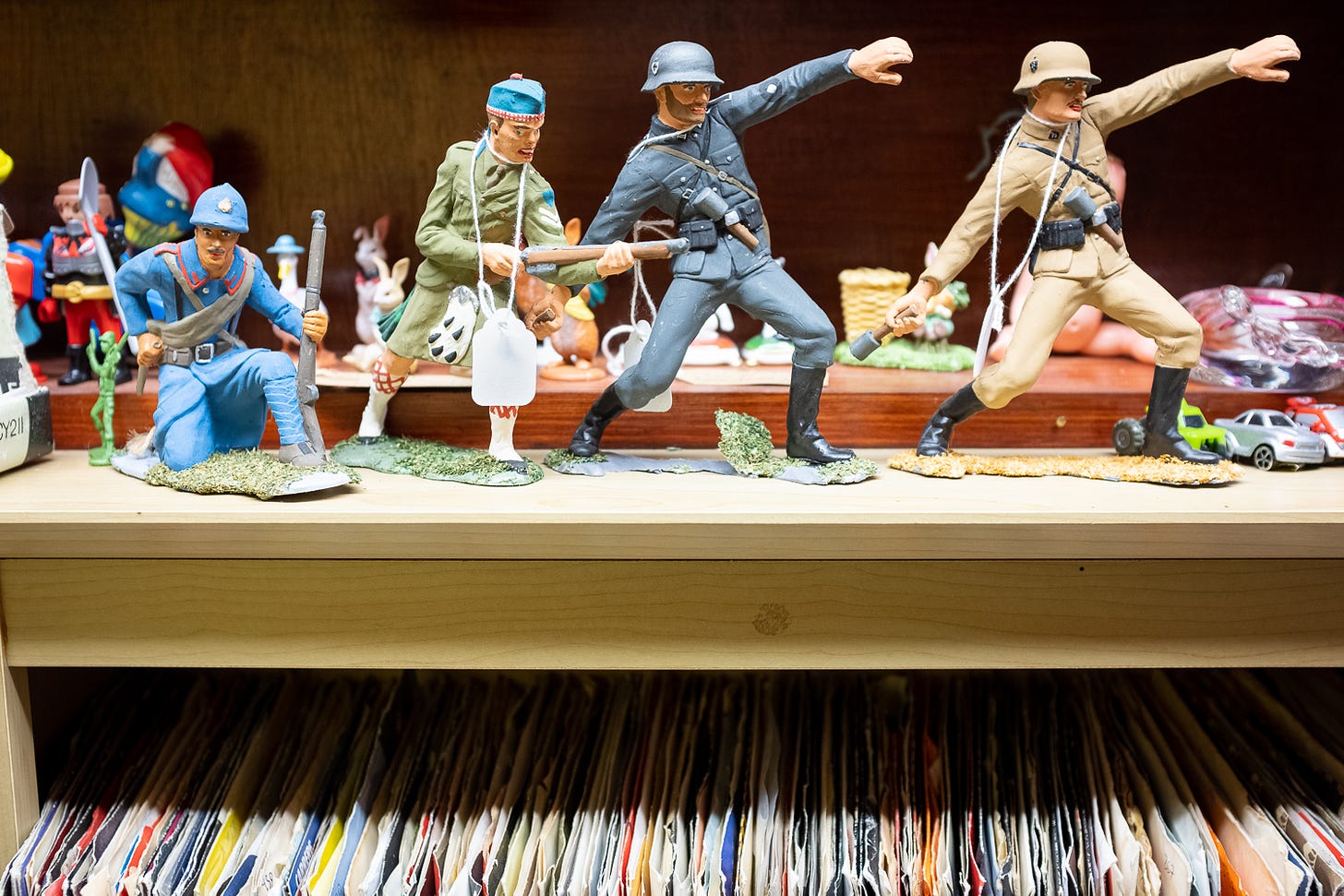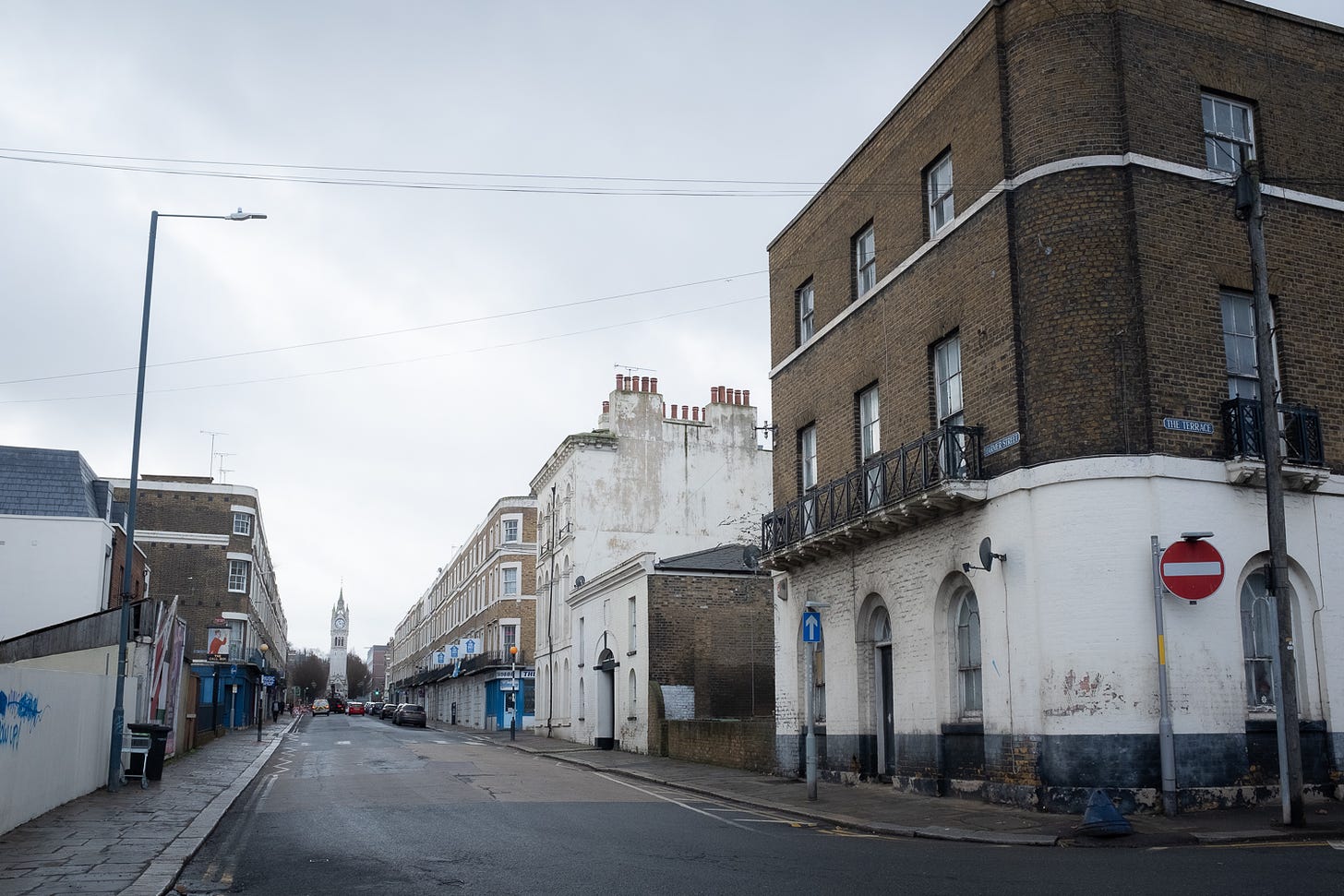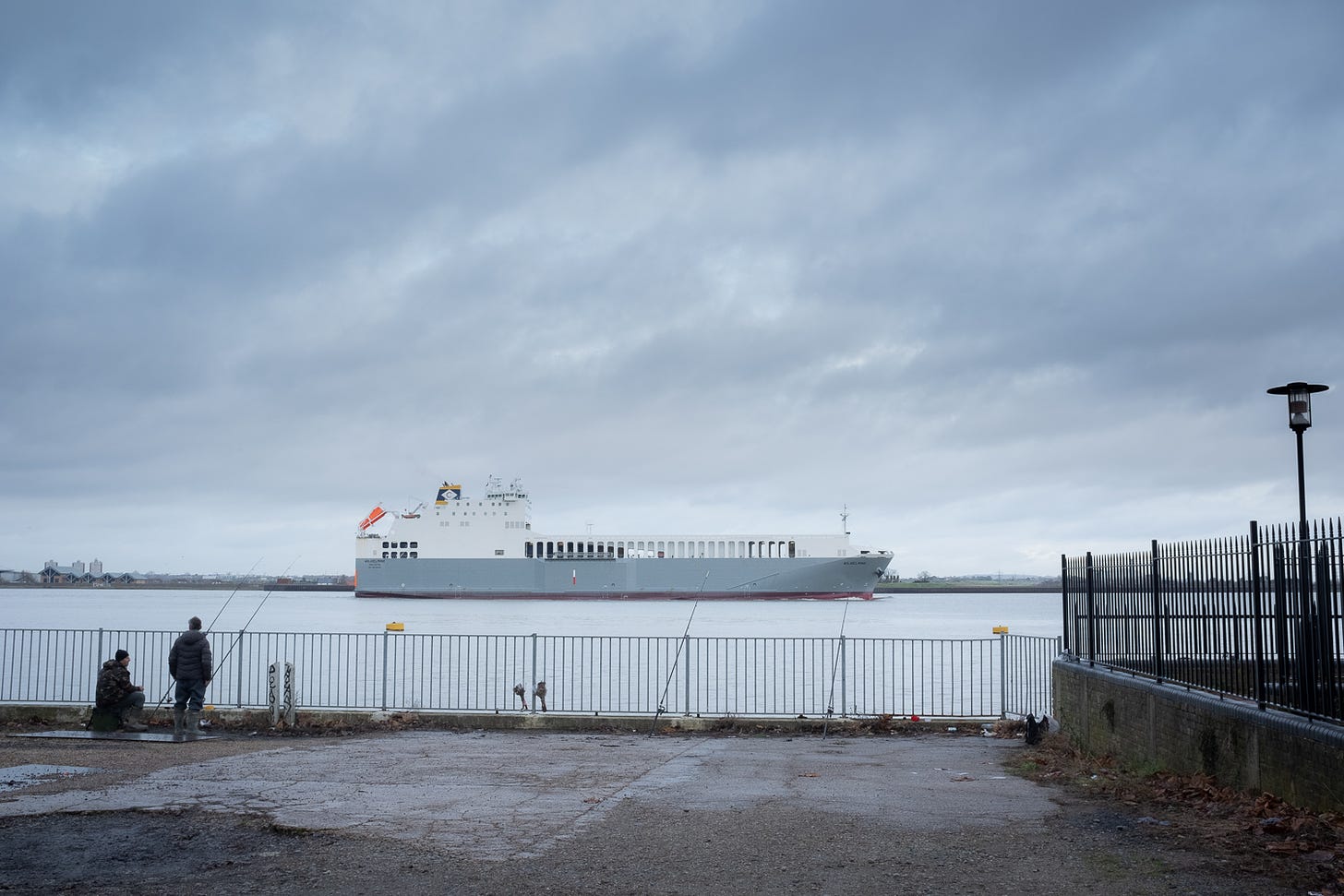Dartford’s a bit of an armpit. Not because of what it looks and smells like, though it wouldn’t be an inaccurate description, but because of where it is, between the thick arm of the Thames and the M25.
When I got into Dartford it was gloomy and dark, a headlights at noon kind of day. The station’s an important one: it’s where Keith Richards met Mick Jagger. It was quiet though, hooded figures with headphones and that was all. They were all probably unaware of the fact. Besides the Rolling Stones, Dartford’s other great pride is that Margaret Thatcher tried and failed to be elected MP here, twice. She did get her own back though when she sliced the town in two with an 8-lane motorway. It’s been an armpit ever since.
I walked towards the main road, through the outskirts of town. If the centre wasn’t up to much, the outskirts were up to even less. The canal was stagnant with reeds and the upturned legs of a shopping trolley mimicked them. The air was thick with the M25’s hum.
I walked between the railway and a row of pebble-dash houses. There was a tragic, deflated Santa slumped over a garden wall at the far end of a dead-end road. Only the postman would ever see it, and he was on strike anyway.
There was a lone figure on the motorway bridge, his hands in his pockets. He watched unmoved as the traffic hurled past. In the distance, the Dartford Bridge rose up like the spine of a prehistoric sea creature. The man had a camera around his neck.
“Are you a photographer?” I called over the noise.
“Yeah,” he called back, “Transport.”
He was photographing lorries, waiting like a fisherman for the right one. He said there were all sorts of lorries worth photographing. “Plenty of interest,” he added with a nod.
“Like decorations?” I wasn’t sure what sort of thing he was after.
“Yeah, sometimes. You get some fascinating liveries coming past. Or just foreign trucks. You get some really interesting foreign plates. Places like Poland, Ukraine, Germany… Plenty of interest.” He nodded again.
It was one of the best spots around he told me, one of his favourites. He would come out whenever he could and stand there watching the lorries, sometimes photographing them, mostly not, wondering where they were going, wondering what was in them, watching as the road streamed past with all its movement and mystery. He lived not far from me in London. He would have walked past the deflated Santa I realised.
I went on and found the road out of town. Even the names around there were depressing. I looked at my sign. GRAVE SEND. Who’d stop for that? Someone did though.
Marny’s three-legged dog panted in my ear. His name was Idris, after a dragon in a long-finished cartoon. Marny had moved back to Gravesend from Canada about a year before and brought Idris along. He was still getting used to it, as was she. They’d lived on the prairies for the last few decades.
Her father had sold his company in London and bought a farm in Manitoba. The family moved out there and lived amid acres and acres of wheat. There was little else there but the expanse was freeing. Marny had got her own farm when she grew up. It was beautiful she said.
“Very different to Gravesend,” I remarked, looking out over the warehouse roofs towards the Thames, imagining the endless horizon she’d known.
“The racism out there was awful though,” she added out of the blue, “The cities in Canada are pretty cosmopolitan but once you get out into the prairies…” she shook her head gravely. She’d lived near a Sioux reservation. She’d felt the injustices keenly. The poverty on the reservations was abhorrent.
Politicians promised help but it was never anything but hot air she said. Especially Trudeau. “He came to power on the back of a wave of child suicides on the reservations,” she explained, “There’s nothing for them to do: no jobs, no clubs, no industry, no nothing. So they just get into drugs. He promised big things but he’s done nothing. No…as you get older you get wiser to politics. You still vote and hope, but politicians never do anything.”
I said that’s not always the case. A few months ago a politician had had a pretty big impact in Britain. 44 days was all it took. She laughed. “That’s true…”
“Do you miss Canada?”
“No.” Her reply was to the point, “It’s wonderful to be home. Sometimes if you’re bored of your country or your home, you’ve got to go away for a while to appreciate what you’ve got.”
That’s the arc of every great story in history, I told her. The “Hero’s Journey.”
We came into Gravesend. It was fitting talking about indigenous North Americans with Marny. Gravesend is where possibly the most famous is buried (in our culture at least): Pocahontas. Aged 16 in 1613 she was captured and married to a tobacco planter. He brought her to England to show her to the country and she became a fabled celebrity. But as they prepared to set sail for Virginia once more, she died right here in Gravesend. No one knows why and no one knows where she’s buried, although it’s somewhere in the graveyard of St George’s Church.
Sitting as it does on the Estuary, Gravesend witnessed many a ship sail for colonial exploits. Most passed silently, but for others it was a landing stage. Here, East India Company ships unloaded their heaviest goods before taking their lighter ships upstream. Here, General Gordon spent 7 years before meeting the tip of a spear in Khartoum. And here, Joseph Conrad began his famous colonial critique, Heart of Darkness, as the sailor Charles Marlow recounts his horrifying tales. “The air was dark above Gravesend,” he writes, “And farther back still seemed condensed into a mournful gloom, brooding motionless.” I looked out at the ships slipping past and it felt the same.
Marny had told me to see the Heritage Quarter so I walked along the waterfront until I reached it. It was a single street. She’d said it was like Regent’s Street, or maybe she said Regency, either way, there wasn’t much to it and it was deserted. There were antique shops, and shops selling vintage toys. Another sold dolls’ houses.
I pushed open the door to Gravesend Model Centre. A bell dinged. The inside looked like an overloaded dockyard. There were thousands of model trains and cars, stations, rail tracks and trucks, all tucked in rectangular boxes, stacked up tall. Narrow alleys wove between shelves. Everything was immaculate and perfectly neat. The proprietor was leaning back behind his desk, his arms folded into his chest. Two of his friends were in and they were having a good chat.
“Really, Putin’s a bit like Hitler,” one said, “Thought it would all be over by Christmas.”
The men all nodded in agreement. “The worst bits in wars come on the anniversary of the start,” chimed another knowingly, and they shared their predictions.
“Well apparently,” the third began, “The Russians didn’t even know about what Stalin did in the Ukraine when he starved everyone.” The three men did know.
“Over here, we all know about the Irish Potato Famine…”
“Yep, we all know about that.” There was no mention of the Bengal Famine.
“It’s because they’ve got total control of the media. Over here, during the Falklands, ITV could go and report whatever they found and there’s nothing the government could do!”
They all agreed the war in Ukraine was tragic and nodded along sternly.
“Well, I best be off…” And with that, they dissolved.
I followed them out and continued up the hill. It got steadily busier the closer to the end of the Heritage Quarter I got. The Costa near the top had a few customers, the Primark had even more, the McDonalds was busier still, but the busiest of them all was the Robert Pocock, a Wetherspoons. A lively crowd drank their lagers and smoked their cigarettes. It was only 10:30.
Marny was right, there were some handsome buildings in Gravesend. Most of them were practically dilapidated though. Harmer Street was one. A Georgian row with neat lines and quaint, empty shops, peeling paint and graffiti. Even the For Sale signs were scribbled on.
Today Gravesend is the most diverse part of Kent. It has one of the largest south Asian and Sikh communities in the country and has one of the biggest Gurdwaras outside India. A Kent Live reporter, Hedi Mehrez, opened a piece on the town, “It may not be the most aesthetically pleasing, but I had fallen in love with Gravesend from the moment I got off the train.” There may no longer be ships sailing to every corner of the globe but there was food and people from all those same places. That's what Mehrez liked most.
I decided I too liked Gravesend. I liked how it had been witness to so much. Caesar’s triremes had once gone by, and Viking longboats, great sail ships, cruise ships, steamboats and Men O’War. Gravesend had seen them all, wondered what and who was on board and where they were all
going.
It was like the man on the motorway bridge.







